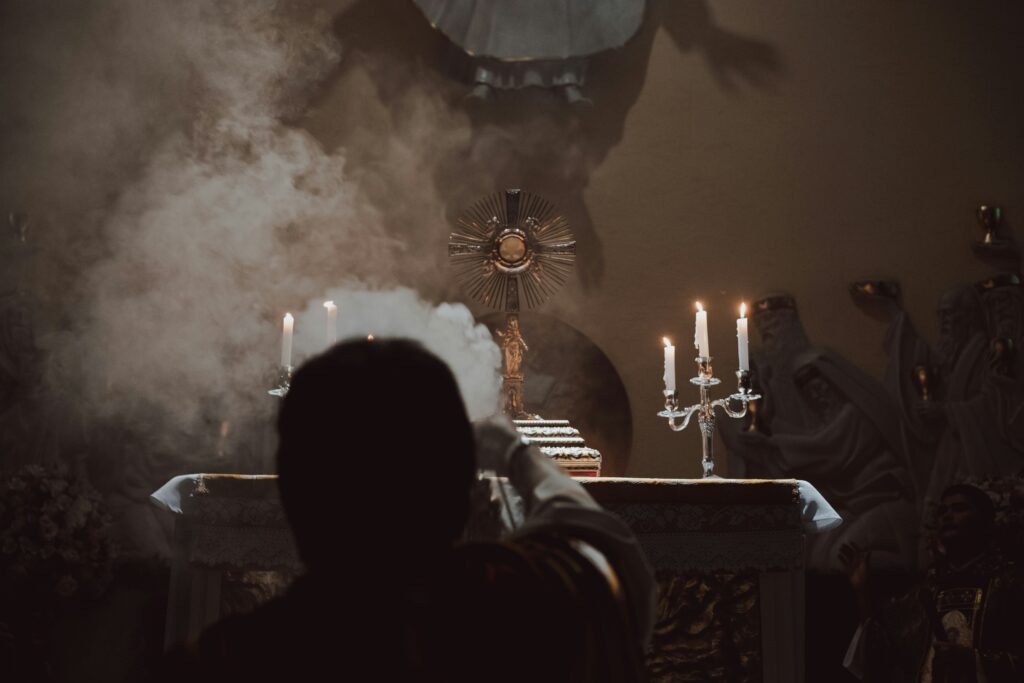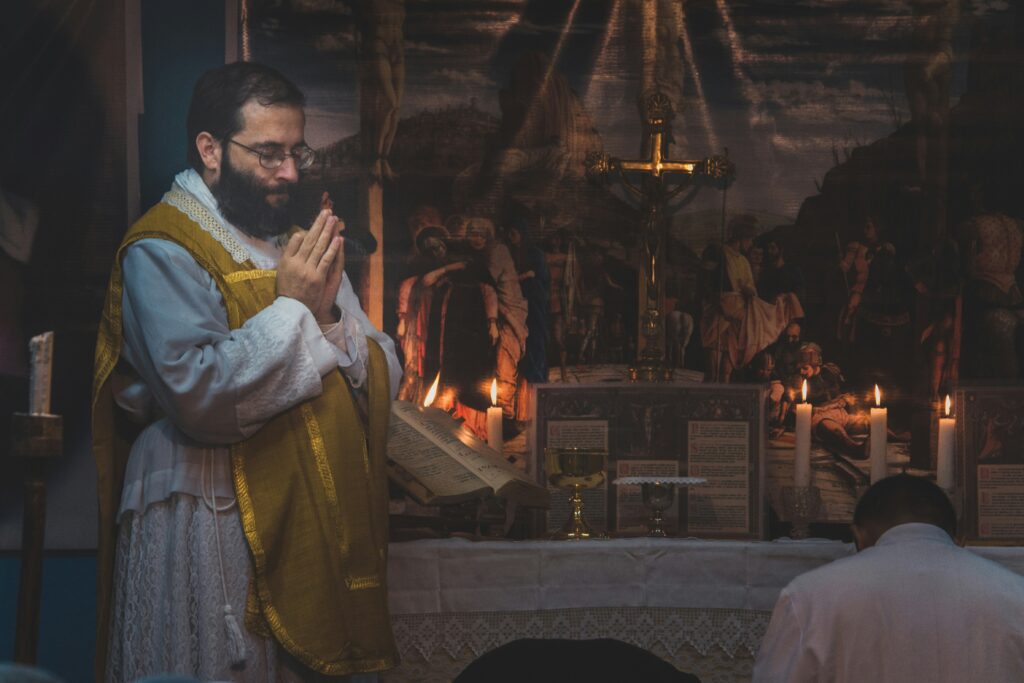“We will do and we will hear”
ַעֲשֶׂ֥ה וְנִשְׁמָֽע
(Ex 24:7)
Hopelesscism (noun [u] /həʊp.ləs.zəm/): the practice of proposing unworkable solutions to intractable problems
Introduction
The most common reaction after the election of Pope Leo has been a genuine sigh of relief. The hope is that this new papacy represents a return to some kind of normal. And signs do indicate that many things are now returning to at least the predictable, if not the ordinary. But not everything. Which raises an important question: do we still know how to recognise ‘normal’? And even if we still know how to recognise it, do we know how to restore it? After so many decades of confusion, abuse and infidelity to the Church’s central mandate- to preach Christ crucified– are there enough faithful left- bishops, priests and laity- who know what normal actually is?
Before we can return to normal, we must first clearly understand the particular historical moment in which we live: we are not living through a crisis; we are actually living through the fallout after that crisis has hit. Or to give an analogy- we are not living through the impact of an explosion; we are living through the fallout after the explosion. This may seem like a distinction without a difference- but when it comes to the life of the Church- it maters a great deal.
Intellect and will
There is no point rehearsing the syllabus of errors of the last several decades. They are the details of the crisis, that sadly, traditionalist know all too well. But how are we to understand the fallout? It seems obvious that the fallout has been a collapse in Catholic culture and Catholic life- liturgical, pastoral and spiritual. The fallout is in the statistics and can be captured with a headcount or Pew research poll. But even the statistics, as revealing as they may be- do little to convey the nature of the fallout with which we must now contend. From a pastoral point of view, the fallout from this crisis is not just confusion about what the Church teaches on certain complex topics; rather the fallout itself is a collapse of Catholic resolve. The fact that we are living through the fallout of a crisis means that we are not just contending with confusion in the Catholic intellect, we are also dealing with the total weaking of Catholic will. We aren’t just muddle-headed; we are lily-livered.
What lies at the heart of the present moment is not simply that we have imbibed a whole lot of bad ideas- although we have done that- we are now practicing those bad ideas as bad habits. We are not just confused by bad ideas- we are now living them out consequentially. And this is why the fallout is different from the explosion and what makes it so toxic. To give you but one example of what I mean: the explosion in the 60’s was the idea that the Eucharist was essentially a ‘meal’; the bad habit of 2020’s is that we demand to be fed at our pleasure from a menu of our choosing.
When bad ideas become bad habits, they pass from the intellect and infect the will. Those ideas become second nature to you; and thus, become far harder to recognise and from which it becomes very difficult to break. A bad idea, before it becomes a bad habit, can be argued with, resisted and overcome. When it passes over into the will, it must be exorcised (I am not referring to an exorcism in the supernatural sense, but in the moral practice of reform of the will). And this, is a far harder task. And this is why it is important to make this distinction. Our pastoral task is not just to argue against bad ideas- although we must still do that- we must also reform the will, which is a far harder thing to do. This is task is very much at the heart of the Oriens Foundation.
An absence of will
Much is made of the invention and future of AI. Philosophically, we are asking ourselves whether AI will ever be able to ‘think’ in way that is more than just algorithmic imitation of how humans think. A question that does not seem to ever get asked is- can AI actually will anything? Will AI ever get to the point that it can will freely as humans do? The question is somewhat caught by our concerns that AI will take over the world and run amok. But even that, as worrying as it might be, doesn’t really address the question of a free will. The point of introducing this tangent, was the fact that the will is conspicuously absent from many philosophical, theological and cultural discussions. A civilisation like ours, that has done nothing but glorify freedom without responsibility, no longer cherishes the very faculty that stands at the base of genuine freedom- the human will. Our technological and scientific advancement has led us to a rather conceited love and admiration for our intelligence- but has left us with a rather distrustful and dismissive view of the human will. Culturally, the will is not even an afterthought. We no longer trust the will. In fact, we now no longer even consider the will in any particular spiritual or theological depth. It is as though we have forgotten what makes us free and the faculty that makes us saints.

So, where does that leave the Church and Her pastoral future?
Habits are destiny. Whatever you do habitually will determine where you end up in your life. It will impact your health, your family, your profession, your religion- every area of your life is comprised of habits both good and bad. But habits also come in two kinds: those of which you are aware; and those which go unnoticed- especially to you. The good habit of making your bed in the morning and that bad habit of not saying thank you to your spouse for those many little things that the he or she does for you. All these things matter. That has been the wisdom of the Church and stands at the basis of her moral and spiritual wisdom- pay attention to what you do on a regular basis. Not what you do when you steel yourself for great action- those may be necessary, but they are rare. Pay attention to what you do habitually. This is the basic intuition that stands at the heart of the Church’s moral teaching on virtue and holiness.
But how does one do that? How do we pay attention to the things that we do habitually; and how do we do that when it comes to the life of the Church? Given that we are a billion souls give or take, can anything meaningful be said about habits when we are so many? And even if we can say something vaguely intelligent about habits in the context of so many souls- what does it tell us? This is what we will examine now.
The worship of God
The first priority of Catholicism must be how we worship God. That is the first and most important thing we do as Catholics. And thus, it should be our priority. And here is the first problem- this is not clear to most Catholics. There are many Catholics who practice the faith sincerely, who would not choose divine worship as their principal task. There are many more appealing and socially conscious alternatives that press upon us as our priority- outreach to the peripheries, recycling, banning of plastic straws etc. The fact is, that the first commandment- to love the Lord your God with your whole heart and above everything else- does not admit exceptions. And it does not allow for any personal interpretation or tinkering. If I am to love God as He deserves my love- I cannot tailor this responsibility to my own whims or preferences. It imposes on me a strict duty that I must lean into with my whole being. It is my first and most important habit as a Christian.

The totality of the first commandment is not an expression of God’s vanity: God’s demands are so onerous because His self-importance is infinite. That is contemptable nonsense. As in all things, everything that we do for God redounds to our benefit. The importance of such totality in our love for God, is to learn not just to love Him, but also to learn to trust Him. Love of God is comparatively easy, what is difficult in the spiritual life, is to actually trust God. It is far easier to believe in God than to believe God- to trust God will show up when He must, to trust that whatever outcome I must endure, is the best of all possible scenarios. It is why we are called to love totally, so that we may learn to trust completely.
Our failure to prioritise God’s worship as He must be worshipped, has led us to many bad habits. It is not limited to the liturgical minefield that we have created for ourselves. And it is not the just sloppy sentimentalism or the hyper-individualism of modern praise and worship. These are effects of our bad habits. The habit itself is something different.
Our worst habit
The principal bad habit that emerges from our failure to prioritise God is the vice of enlightened self-interest. When we fail to prioritise the Lord God, we discover an infinite number of ways of preferring ourselves. And this begins, not by an overt election in favour of the self- it begins rather subtlety, almost imperceptibly at first- with the simple preference of a good with my own benefit in mind, which does not require me to renounce God or to even ignore Him. But this, even though it may seem like a trivial matter in the moment, is where we go most wrong. The breaking of the first commandment may find its most extreme expression in flagrant idolatry- but it finds its most common expression in preference; my preference for my own benefit at the expense of everyone and everything else. But ‘preference’ still needs some camouflage. And that is why our self-interest must always be ‘enlightened’; enlightened by my commitment to some greater good– a good however, that always seems to favour me.
Enlightened self-interest is an insidious vice because it is easy to hide behind some pretend virtue. The pastor who refuses to correct some bad behaviour in his congregation lest it cause hurt and division: which translates into angry letters to the chancery. Or the bishop who can’t stomach an unpleasant conversation with a disgruntled parishioner because the pastor won’t let her wash the Precious Blood down the sink; who then sells the pastor down the river into which that sink empties. Or the eagerness to appease the secular authorities by throwing money at ‘problems’ that require genuine reform. Usually, the kind of reform that comes from removing the man in the office because he is incapable of functioning in that office. But I digress.
But all these issues are really one issue: a collapse of Catholic will. And by that, I mean we no longer pursue virtue for virtue’s sake, rather I pursue some end with my own gain in mind: something preferably capturable on Instagram; otherwise, what’s the point? We have wandered far from the Jesuit missionaries of the Amazon and the Franciscan martyrs of Japan.
Professional Catholicism
All of this has led to a rise in hopelssicism- the habit of proposing unworkable solutions to intractable problems. Which is not so much an error of thought, but a coverup for cowardice. If I keep proposing solutions that that clearly won’t work, I may discourage anyone from wanting to try (and so no one can make me look bad), and I have an automatic defence against anyone who criticises me (well, we tried, it just didn’t work ‘this time’). This is why the church lurches from synods on synodality to plenary councils and now the much-touted local synod- a kind of synodal Hail Mary (and not the Marian kind). But what has all this fumbling about in the darkness achieved, other than the fact it looks clear to the world that those in charge haven’t the faintest clue as what to do or the slightest confidence in the faith they say they want to renew. We keep proposing the same solutions that don’t work to problems that we can’t fix in the name of a progress we can’t define. It is a most bizarre and unhelpful commitment to a tradition that is the very definition of indietrista (backwardist).
As actual traditionalists- committed to living by received wisdom- we must remain vigilant that this kind of backwards commitment to self does not influence us. That we don’t take the bait of adding our voices to the chorus that ‘nothing can done’- which is really the refrain- that ‘nothing shall be done’. Nothing that comes from the wisdom of the ages, anyway. We know that the things that are handed to us are precious, and thus there is a certain fragility to them. Hence traditionalism’s tendency to react negatively when we see the tradition put in danger. We understand how long it took to get to where we are, and so we see quite clearly the dangers when people tinker with it. Hence, there will always be a certain kind of pessimism that attaches to the traditionalist movement. We are a kind of ecclesiastical smoke alarm- much needed; just quite a pain when it goes off in the middle of dinner. But this negativity- although essential- must not come to define everything about us.

There are going to be some rather questionable appointments made in the coming months. Perhaps even years. There have been one or two already. But just pause for a moment and remember- the church bureaucracy that caused Benedict’s XVI’s resignation in 2013, do you think it has been improved over the last twelve years; or worsened? Do we believe that the last twelve years brought a cure to our problems, or an exacerbation of them? Pope Leo can only make appointments with the people who are available, and who are somewhere within his reach. There may be a great pastor who make a morally courageous bishop- but who will notice? There aren’t that many of them and they aren’t that much desired anyway. The Pope is the universal pastor of the Church, but he is not omniscient. And he is surrounded by people of the last administration. So, it is going to take him much time to find his own men, and then find other men to join them. In the meantime- we will have to endure some rather mediocre (to say the least) situations. This is not to justify some rather shocking appointments; it is just to give another perspective. In the meantime, let us not treat everything as though it were a catastrophe, although some things certainly are. We must praise what is praiseworthy and encourage wherever goodness is to be found. Let us not just be another version of the ecclesiastical hopelssiscist; someone who pretends solutions that have never worked to problems he doesn’t understand in order to keep a cushy job in the Church he doesn’t deserve. There is enough baggage in our chanceries without our over-stuffed carry-ons coming along for the ride.

